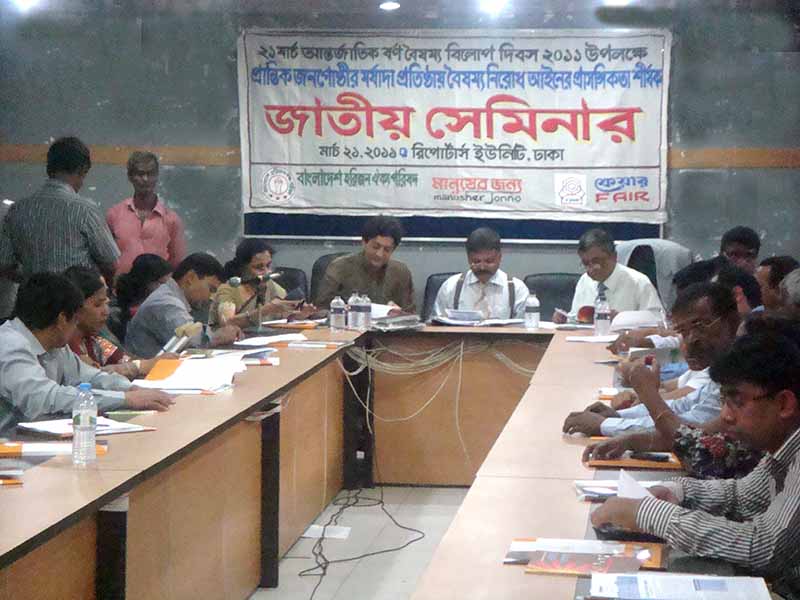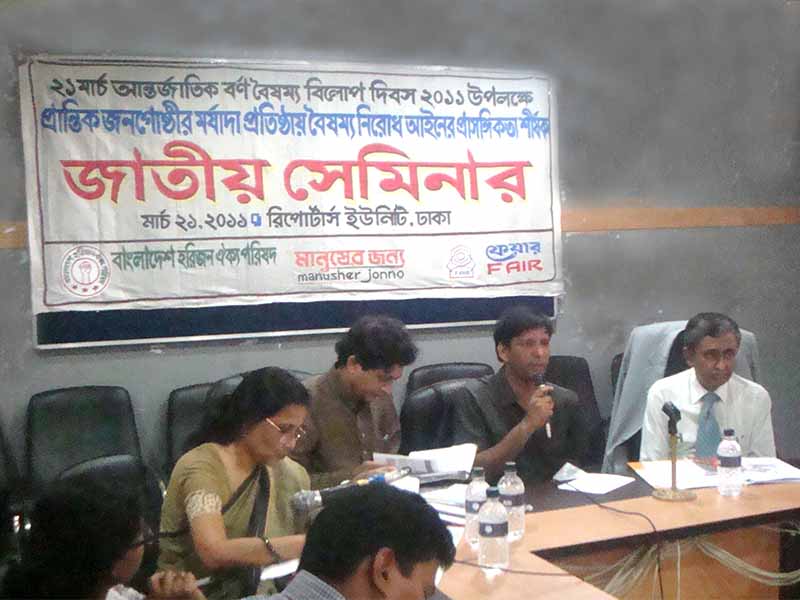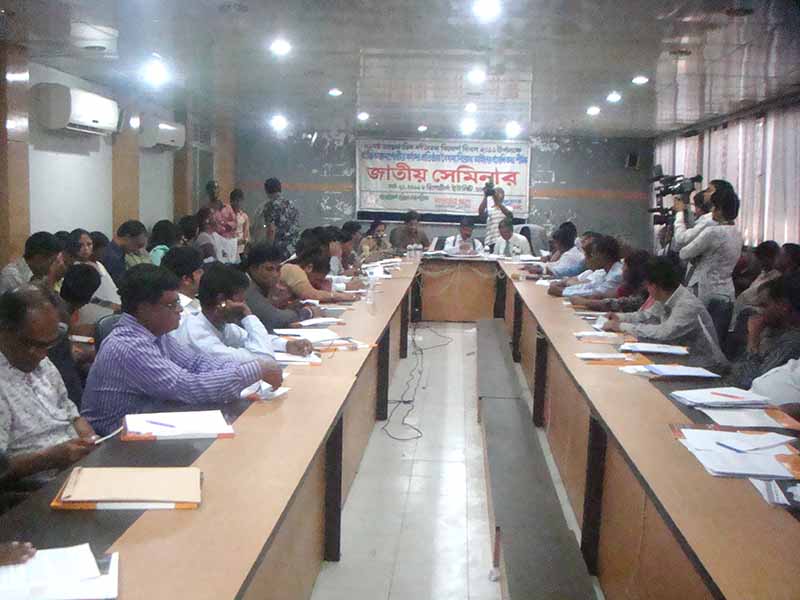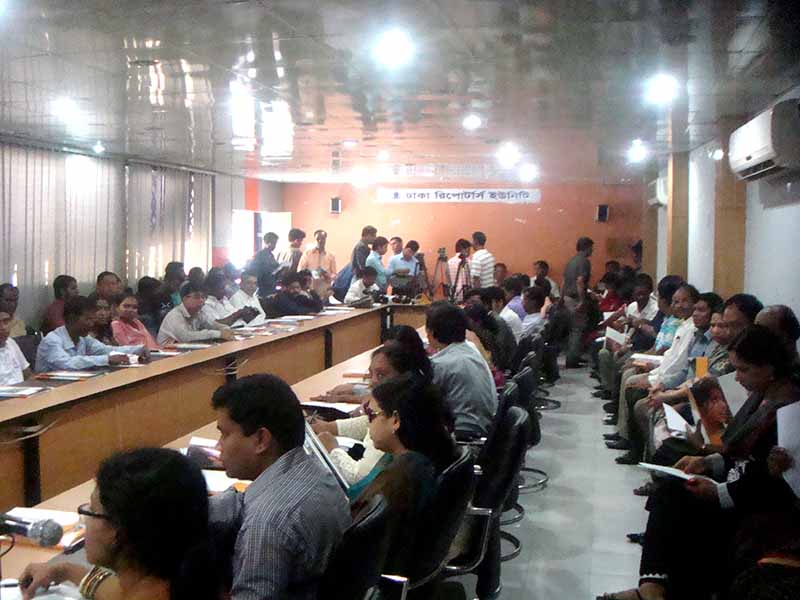Anti discrimination Law Relevance Seminar for Dalits

Anti discrimination law: 5.5 millions of the total population of Bangladesh are marginalized people. They are in different ways discriminated by the mainstream people. Although the constitution of Bangladesh promises not to do discrimination to any, these groups of people face discrimination at every step of their life.


This type of discrimination violets the articles 19, 27 and 28 of the constitution of Peoples’ Republic of Bangladesh. In order to ensure the constitutional rights of the marginalized people and to create pressure on the higher level of the government, with assistance of FAIR and Manusher Jonno Foundation, Bangladesh Harijon Oikko Parishad arranged a national seminar on Relevance of Anti-discrimination law to establish the dignity of marginalized people to observe International Elimination of Racial Discrimination Day on 21st March, 2011. The seminar was held at the conference room of Reporters Unity, Dhaka.
The chief guest of the seminar, Dr. Mizanur Rahman, Chairman, National Human Rights Commission, said in his speech, “The marginalized people must be brought under census with their identity. The state has to be the poor friendly, not the rich friendly. The rights of Dalit, Harijon, indigenous people, transgender, disable, sex worker and other marginalized people has to be recognized as basic rights in the constitution. ” He asked the sleeping judges to awake. He asked all to become proactive to establish the rights of the marginalized people. He mentioned some examples that described violation of rights of marginalized people by different quarters. The representatives of marginalized people presented five essays in the seminar. Rabindranath Soren, president, Adibashi Oikko Parishad, complained in his essays that the government was doing nothing to establish the rights of the marginalized people.
Then special guest Dr. M Shah Alom delivered his speech. He said, we who have knowledge and understanding are beside them. He said, this group of people is a great force. As per the constitution, the government is bound to work for these people. Prior to compel the government to enact law, we have to speak about the constitutional rights. It is written in the constitution that all people are equal. So if the right of marginalized people is not ensured, it is violation of the constitution. It is written in section three of the constitution that the government can take special initiative to develop the people of backward communities. So the government has to take initiative accordingly. He said, there is nothing adverse about the sex workers. He said, Disable Welfare Act will be changed to Disable Right Act within 2011. He said, he would recommend to the government to enact Anti-discrimination law. He said, humanity is the greatest religion. There is no difference between people. He hoped that the movement of the marginalized people would succeed.
Renowned economists Dr. Abul Barakat, Chairman, Department of Economics, Dhaka University and Dr. Shah Alam, Chairman, National Law Commission were present in the seminar as the honorable guests. Professor Amena Mohsin, Department of International Relation of Dhaka University and Lecturer Jobaida Nasrin, Department of Anthropology, Dhaka University delivered speeches in the seminar as specialists.
Dr. Abul Barakat said, economic, social freedom, transparency and security is never possible with exclusion of a portion of the society. He said, 82% of the disables are poor. He disclosed the loopholes of census and said the number of non-muslins is tactfully shown smaller than actual in the census. Though article 28 of the constitution says the equality of dignity of all citizens irrespective of nationality, religion, caste, creed and gender, the reality is quite different. Though there 45 groups of indigenous people in Bangladesh, the government has listed only 27 of them. Things are clear through the national budget. 2% is allocated for 2% of the population. The marginalized people were the first who responded to the war of liberation. So we have to understand the marginalized people and make development plan in association with them.
Special guest Amena Mohsin said in her speech, the marginalized people are discriminated by both of the state and the society. The Dalit women marginalized to some more extent in their own marginalized community. He said, the customer of sex trade have to be identified. The marginalized people often don’t want to be identified for the fear of discrimination and harassment. They don’t have any representation to anywhere. Their representation has to be ensured.
Special guest Zobaida Nasrin said, the government listed 27 small anthrop groups without any source. If the indigenous are recognized, the will get the right of land and that’s why some indigenous of the Chittagong Hill Tracts are not recognized. They are marginalized in all indicators. There Bangali labors are paid with BDT 100-120, whereas the indigenous are with BDT 60-70. Sex trade is recognized by the state. For the demands of the males in the male-dominated society, sex trade will exist. But the state and the society don’t want to recognize them. But these people are use to ensure of allocation of grants for HIV/AIDS. Dalit women are not allowed to take food in a restaurant. But their hands are turned (for sex). She said, on 25 March, 1971, the marginalized people of sweeper colony were the first who came forward.
On behalf of floating sex workers, Sathi Akhtar, Durjoy Nari Sangha, presented essay in the seminar. On behalf of transgender people Liza, Badhon Hizra Sangstha, mentioned the problems of the transgender people in her essay. The major problems of transgender people are employment, house rent, medical treatment, schooling and torture by terrorists. The transgender people become bound to live in slums as none rents house to them. As they become involved in sex trade, they are infected with AIDS. As per the law of 1948, they have rights, but it is not practiced.
On behalf of the disables, Feredousi Akhtar Rubi, ADD presented essay in the seminar. He wrote in her essay the family members of disables think of begging using them. The rich people hide their disable children. Disable women are being tortured. She said, the government excludes the disables from mainstream development programs. The government enacted Disable Welfare Act-2001 to show pity on the disables. The government signed the UNO Disable Rights Charter in 2006, but didn’t enact any law to enforce the charter. The disable has come under no other than safety net programs of the government. BDT 300/- monthly allowance for disables is really insufficient. Most of the organizations arrange events without thinking of the disables.
Nirmol Chandra Das, General Secretary, Bangladesh Harijon Oikko Parishad, presented essay on behalf of the Dalit people. He said, asked people to think about the services rendered by the Harijons. He further said, the Harijons are discriminated everywhere. There are many countries with a smaller population than the Dalit people of Bangladesh. But as there is no census, the Dalit people of Bangladesh are excluded from development programs. Although the constitution of Bangladesh promises to ensure equal rights to every citizen irrespective of religion, caste and creed, as because there is no anti-discrimination law, discrimination is practiced. Still humiliating customs of untouchables is practiced. We have no entry to restaurants and if we get entry they make us use marked plate, cup etc. Harijons face discrimination at schools also. The Dalit people are compelled to live in places different from others’ and with humiliating names such as Muchipara, Methorpotti etc. They have the right of contest in election, but nobody votes them. Dalit girls are victims of sex harassment. They have no room for sitting in the office they serve. They are not counted in the census by their own identity. As a result, they don’t come under safety net programs of the government. They are made bound to work with low wage. The educated young Harijons are persuaded tactfully to receive employment of sweeper position. Dalit people have no other choice but to live in unhealthy environment. No list of Harijon children of school admission age is prepared to admit them in schools. Nirmol Chandra Das upheld the demands of Dalits. He demanded to enact anti-discrimination law. He said, the Dalits should be counted with their identity in the census. 80% of cleaning job has to be reserved for the Harijons.

The guest and others expressed their support to the demand of enactment of anti-discrimination law in order to ensure the constitutional rights of all of the marginalized people including Harijon, Dalit, indigenous, transgender, sex worker and disable. They vowed to stand beside them. The made the following recommendations:
- Anti-discrimination law has to be enacted.
- All have to be proactive to establish the rights of the marginalized people.
- The Dalit people have to be counted in the census with their own identity.
- The state has to be poor friendly, not rich friendly.
- The rights of the marginalized people including Harijon, Dalit, indigenous, transgender, sex worker and disable have to be recognized as basic rights in the constitution.
- The sleeping judges have to awake.
- 80% cleaning jobs have to be reserved for Harijons.
- We have to understand the marginalized people and development plan has to be formulated in association with them.
- Representation of marginalized people to state and society works has to be ensured.
- The Dalit people have to be provided with the rights and opportunity to take food in restaurants.
- Their constitutional rights have to be ensured.
- The security of Dalit women has to be ensured.
- Dalits have to be given the right of land.
- The Dalit children have to be given the right to get admitted into any school.
- Educated you Harijons have to be provided with jobs compatible with their education level.
The seminar was launched with the welcome speech of Dewan Akhtaruzzaman, Director, FAIR. Krishna Lal, president, Bangladesh Harijon Oikko Parishad, presided over the seminar.
More three seminars on the same topic were held in Sirajgonj, Khulna and Jessore respectively on 27, 28 and 29 March, 2011. Mayor Mokaddes Ali, Mayor Talukdar Abdul Khalek and Mayor Md. Maruful Islam were the chief guests of the seminars of Sirajgonj, Khulna and Jessore respectively. They promised to solve the problems of Harijon people related with their salary, leave, residence education and others.
